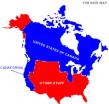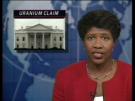Can Harper do it : the Bush effect in Canada (and the United States)?
May 3rd, 2005 | By Randall White | Category: Key Current Issues Stephen Harper’s Conservative caucus has been meeting in Ottawa, trying to figure out what to do next.
Stephen Harper’s Conservative caucus has been meeting in Ottawa, trying to figure out what to do next.
In particular, is it still correct to talk about what the latest issue of the Ontario newsletter Inside Queen’s Park has nicely called “the pending annual contest to decide who isn’t governing Canada”?
Meanwhile, the bigger brothers in the US Congress have been having their own prime-time soap opera in Washington. It almost makes you wonder whether some strange new disease actually has been leaking across the border, in one direction or another.
 Paul Krugman’s column for Monday, May 2 in The New York Times, to take one very specific case in point, is about George W. Bush’s current contentious plans to reform the US social security system, whether it needs it or not. And he reports that “you can’t just accept the administration’s version of what it’s doing. Remember, these are the people who named a big giveaway to logging interests Healthy Forests.'”
Paul Krugman’s column for Monday, May 2 in The New York Times, to take one very specific case in point, is about George W. Bush’s current contentious plans to reform the US social security system, whether it needs it or not. And he reports that “you can’t just accept the administration’s version of what it’s doing. Remember, these are the people who named a big giveaway to logging interests Healthy Forests.'”
The real ultimate upshot of President Bush’s scheme, Krugman goes on, is that “Social Security as we know it would be phased out for the middle class.” And “the attempt to turn Social Security into nothing but a program for the poor isn’t driven by concerns about the future budget burden of benefit payments.” If the president was seriously “worried about the budget, he would be reconsidering his tax cuts.” In the end it is all “about ideology: Mr. Bush comes to bury Social Security, not to save it. His goal is to turn F.D.R.’s most durable achievement into an unpopular welfare program, so some future president will be able to attack it with tall tales about Social Security queens driving Cadillacs.”
 There is no exact parallel to quite this particular issue in Canadian politics at the moment. To some significant enough degree, Canada remains a kind of geographically gigantic, semi-independent blue state on the northern US border. But there are certain broad similarities perhaps with, say, concerns about the future of Canada’s publicly funded health care system. (Might someone even be planning to phase it out for the middle class as well, and turn it into another kind of “unpopular welfare program”?)
There is no exact parallel to quite this particular issue in Canadian politics at the moment. To some significant enough degree, Canada remains a kind of geographically gigantic, semi-independent blue state on the northern US border. But there are certain broad similarities perhaps with, say, concerns about the future of Canada’s publicly funded health care system. (Might someone even be planning to phase it out for the middle class as well, and turn it into another kind of “unpopular welfare program”?)
There are still further and probably more exact parallels with concerns over how you just can’t take what neo-conservative ideologues say about what they may or may not do at face value. A Canadian poll reported on over the April 30May 1 weekend “found that 57 per cent of Canadians find it somewhat’ or very believable’ that Stephen Harper and the Conservatives have a hidden agenda.’ Only 36 per cent said they find it unbelievable.” At his new party’s recent convention in Montreal, Harper’s team made some strong and, in the eyes of many skilled observers, even successful efforts “to move Conservative policies to the centre.” But many ordinary voting Canadians still “harbour doubts.”
 At least some significant chunk of this lingering suspicion of the Harper Conservatives in Canada must have something to do with the ubiquitous US television and press reports that most Canadians who are paying attention regularly see, about what the officially governing Bush conservatives are doing, or trying to do, right next door in the United States.
At least some significant chunk of this lingering suspicion of the Harper Conservatives in Canada must have something to do with the ubiquitous US television and press reports that most Canadians who are paying attention regularly see, about what the officially governing Bush conservatives are doing, or trying to do, right next door in the United States.
For historical reasons politics in Canada and the United States have rather different forms, but inevitably quite similar contents. Or as was said in the late 19th and early 20th centuries, Canadian politics is “American actors on an English stage.” And nowadays even the stage is considerably less English, and more American, than it used to be.
 Yet the deep red-state south is one part of the USA today that Canada in the far north still lacks. And whatever the truth may or may not finally be about Stephen Harper, this still seems to be hurting the new Conservative Party of Canada.
Yet the deep red-state south is one part of the USA today that Canada in the far north still lacks. And whatever the truth may or may not finally be about Stephen Harper, this still seems to be hurting the new Conservative Party of Canada.
The polls do indicate that many Canadians are quite appalled by the soft underbelly of the old Chretien Liberal government’s sponsorship program in Quebec – and the dark enough shadow it inevitably does cast on Paul Martin’s current Liberal minority government in Ottawa too. But what if Stephen Harper really is just a junior birdman whose essential spirit comes from Crawford, Texas? As unfair as it all may be, many Canadians still do seem to think that could be even worse. The so-called “Gomery effect” is one key factor in Canadian politics today. But it also seems that you still can’t discount some form of “Bush effect” right next door.
 One big question now seems to be whether Mr. Harper can somehow use the one to get around the other?
One big question now seems to be whether Mr. Harper can somehow use the one to get around the other?

